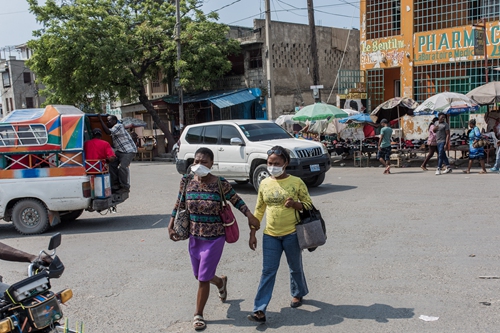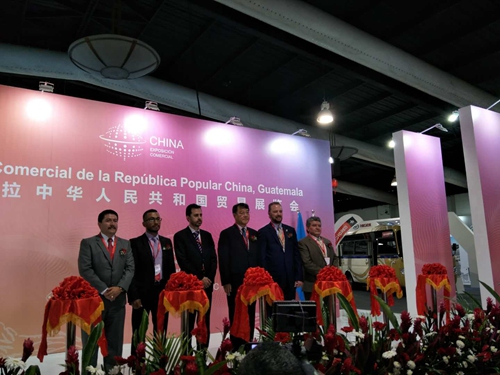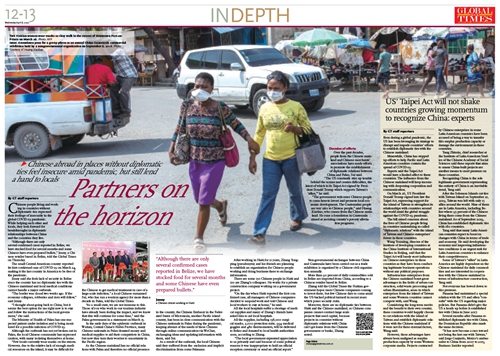HOME >> CHINA
Chinese abroad in places without diplomatic ties feel insecure amid pandemic, but still lend a hand to locals
By GT staff reporters Source:Global Times Published: 2020/4/7 18:08:40

Two Haitian women wear masks as they walk in the streets of downtown Port-au-Prince on March 26. Photo: AFP
Chinese people living and working in countries without diplomatic ties expressed their feelings of insecurity in the global COVID-19 pandemic. While helping each other and locals, they look forward for breakthroughs in diplomatic relationships between China and the countries they live."Although there are only several confirmed cases reported in Belize, we have stocked food for several months and some Chinese have even prepared bullets," Jenny, a Chinese retailer based in Belize, told the Global Times on Thursday.
The small Central American country reported its first confirmed case of COVID-19 on March 24, making it the last country in America to be free of the pandemic.
Jenny said she feels lack of security in Belize since the country has no diplomatic ties with the Chinese mainland and local medical conditions cannot handle a major outbreak.
"The border was closed two weeks ago. If the economy collapses, robberies and riots will follow," said Jenny.
"I thought about going back to China, but it seems the best option for me right now is to stay and follow the instructions of the local government," she said.
The Ministry of Health of Palau has one suspected patient under isolation and is being monitored for a possible infection of COVID-19.
Although the outbreak has not yet broken out in Palau, the local Chinese community has expressed caution, with many isolating themselves at home.
"Few locals currently wear masks on the streets. However, due to the relative lack of enough medical resources on the island, it may be difficult for the Chinese to get medical treatment in case of a large-scale infection," a local Chinese surnamed Sui, who has run a tourism agency for more than a decade in Palau, told the Global Times.
"As a small state, we are not immune to this. Those of you who work in our tourism industry have already been feeling the impact, and we know that this will continue for some time," said the Palau government in a statement on March 15.
In the early days of the epidemic outbreak in Wuhan, Central China's Hubei Province, many Chinese nationals in Palau donated money and medical supplies to aid their compatriots in China, but now they turn their worries to uncertainty in the Pacific region.
As the Chinese mainland has no official relations with Palau and therefore no official presence in the country, the Chinese Embassy in the Federated States of Micronesia, another Pacific island country, has been in close communication with the Chinese nationals in Palau during the pandemic, keeping abreast of the needs of these Chinese through online communication via WeChat, exchanging ideas and updating information with them, said Sui.

Attendants pose for a group photo at an annual China-Guatemala commercial exhibition held by a nongovernmental organization on September 6, 2018. Photo: Courtesy of Huang Xiaobao
As a result of the outbreak, the local Chinese said they suffered from the exclusion and implicit discrimination from some Palauans.After working in Haiti for 11 years, Zhang Yongping (pseudonym) and his friends are planning to establish an organization for Chinese people working and doing business there to exchange information.
There are some 150 Chinese people in Haiti and 110 are Zhang's colleagues. He works for a private construction company working on a government project.
"On the day when Haiti reported the first confirmed case, all managers of Chinese companies decided to suspend work and told Chinese and local workers to stay at home," he said.
All the local hospitals suffer a shortage of medical supplies and many of Zhang's friends have asked him to aid local hospitals.
All the supplies, including 138,000 surgical masks, 2,000 protection suits, 994 medical goggles and 480 thermometers, will be delivered to Belize and donated to local health authorities soon, according to Zhang.
"The local government expressed appreciation to us privately and said because of some political reasons it was inappropriate to hold an official reception ceremony or send an official report."
Decades of efforts
Over the past decades, people from the Chinese mainland and Chinese merchants' associations have made efforts to promote the establishment of diplomatic relations between China and Palau, Sui said.
"The US constantly stirs up trouble behind the scenes and creates difficulties, the latest of which is its Taipei Act signed by President Donald Trump which supports Taiwan's 'allies,'" he said.
"The government welcomes Chinese people to come here to invest and promote local economic development. The Guatemalan people are very nice to Chinese people," said Huang Xiaobao, who comes from the Chinese mainland. He runs a foundation in Guatemala aimed at assisting country's poverty alleviation programs.
Non-governmental exchanges between China and Guatemala have been carried out as a trade exhibition is organized by a Chinese civil organization annually.
More than 90 percent of daily commodities sold in Belize are imported from China, according to a Chinese retailer based in Belize.
Zhang told the Global Times the Haitian government hopes more Chinese companies coming to invest there, but few Chinese dare to come amid the US-backed political turmoil in recent years which poses security risks.
Moreover, there are no diplomatic ties between Haiti and the Chinese mainland, so Chinese companies cannot contract large scale projects that need capital, because projects in countries without diplomatic relations with China can't get loans from the Chinese government or banks, Zhang noted.

Newspaper headline: Partners on the horizon